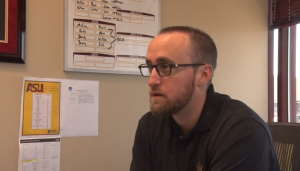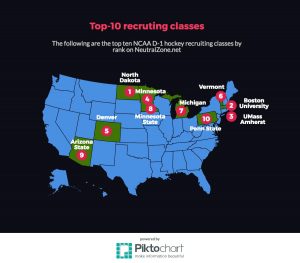- Slug: Sports-ASU hockey, 670 words
- Photo available
By ERIC NEWMAN
Cronkite News
PHOENIX — The Arizona State men’s hockey team, following its first full Division I schedule, has made impressive early gains in its recruiting of junior talent.
ASU is a program without a tradition of high-level hockey recruits or postseason success yet put together the ninth-ranked 2017-18 recruiting class in the nation, according to NeutralZone.net. The team begins play on September 30.
The players did not latch onto a tradition, they chose to start one of their own. In recruiting visits all over the world, coach Greg Powers gave the same pitch.
“You get to start a program and be a founding father,” he said. “You can look back on it in 20 years and know you started something. We have a room full of kids that genuinely buy in to that value.”
The result is that the Sun Devils acquired a higher-ranked class of eight recruits than long-established NCAA tournament regulars such as Minnesota-Duluth, Wisconsin, Boston College and more. The 2017-18 class consists of eight players, including forward Austin Lemieux, the son of NHL legend Mario Lemieux, forward Johnny Walker, defender Jacob Wilson and goalkeeper Mike DePhillips.
Walker hails from Phoenix and even played his miniature hockey days with the now-defunct Phoenix Polar Bears out of Chandler. After playing for a multitude of teams in the North American Hockey League and the United States Hockey League, both funnels for elite junior hockey players, he saw plenty of his teammates and competitors join elite programs. However, he said the new ASU program was his top choice from the start, regardless of its lack of reputation.
“As soon as they went to Division I, I knew that if they reached out to me it was going to be a ‘yes’ from me,” he said. “All that other stuff doesn’t matter as much.”
As a member of the USHL’s Chicago Steel, his team played against, and beat, fellow recruit Wilson and Sioux City in the 2017 Clark Cup finals, the league’s championship. Wilson said that the two “give it to each other” about their time in junior hockey, which is an experience many of the new players share.
He said that with players representing different geographical locations and junior teams, the high level of recruits could start a snowball effect if ASU is able to have early success against top programs.
“Once other players start to see ‘Holy crap, ASU, they can play, they’re beating top-20 teams, they’re getting ranked and other stuff,’ it’s going to change the mindset of a lot of new recruits,” he said.
Though happy to spend time on the ice playing hockey, Wilson said the location means less time in the cold weather than most other hockey programs.
It can be a recruiting advantage over most traditional hockey schools, where winter is harsher than just a 50-degree day in December.
“How often do you get to say you’re playing Division I college hockey, but also that you’re playing golf on the weekends? You can’t get that anywhere else,” Wilson said.
With the foundation built, Powers said the highly-touted class means nothing if the team does not continue to succeed against solid teams.
It will not be easy however, as ASU plays a tough schedule, including 12 games against teams in the preseason NCAA Top 20.
“It’s nice to get the notoriety obviously and to know that our work is being highly touted by other people, but at the end of the day it doesn’t mean anything until it translates on the ice,” Powers said.
Though the team might struggle early, with many of the key players spending minimal time together early in their college careers, Powers is confident that the future could spell positive results for his new recruits.
“I think for the most part we have a core group that I’m hoping will stay for their whole eligibility and for the long haul, and is going to have a lot of success together,” he said.

